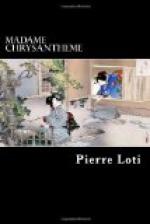Suddenly there enters, like a night butterfly awakened in broad daylight, like a rare and surprising moth, the dancing-girl from the other compartment, the child who wore the horrible mask. No doubt she wishes to have a look at me. She rolls her eyes like a timid kitten, and then all at once tamed, nestles against me, with a coaxing air of childishness, which is a delightfully transparent assumption. She is slim, elegant, delicate, and smells sweet; drolly painted, white as plaster, with a little circle of rouge marked very precisely in the middle of each cheek, the mouth reddened, and a touch of gilding outlining the under lip. As they could not whiten the back of the neck on account of all the delicate little curls of hair growing there, they had, in their love of exactitude, stopped the white plaster in a straight line, which might have been cut with a knife, and in consequence at the nape appears a square of natural skin of a deep yellow.
An imperious note sounds on the guitar, evidently a summons! Crac! Away she goes, the little fairy, to rejoice the drivelling fools on the other side of the screens.
Supposing I marry this one, without seeking any further. I should respect her as a child committed to my care; I should take her for what she is: a fantastic and charming plaything. What an amusing little household I should set up! Really short of marrying a china ornament, I should find it difficult to choose better.
At this moment enters M. Kangourou, clad in a suit of gray tweed, which might have come from La Belle Jardiniere or the Pont Neuf, with a pot hat and white thread gloves. His countenance is at once foolish and cunning; he has hardly a nose, hardly any eyes. He makes a real Japanese salutation: an abrupt dip, the hands placed flat on the knees, the body making a right angle to the legs, as if the fellow were breaking in two; a little snake-like hissing (produced by sucking the saliva between the teeth, and which is the expression nec plus ultra of obsequious politeness in this country). “You speak French, M. Kangourou?”
“_ sir” (renewed bows).
He makes one for each word I utter, as if he were a mechanical toy pulled by a string; when he is seated before me on the ground, he limits himself to a duck of the head—always accompanied by the same hissing noise of the saliva.
“A cup of tea, M. Kangourou?”
Fresh salute and an extra affected gesticulation with the hands, as if to say, “I should hardly dare. It is too great a condescension on your part. However, anything to oblige you.”
* * * * *
He guesses at the first words what I require from him.
“Of course,” he replies, “we will see about it at once; in a week’s time, as it happens, a family from Simonosaki, in which there are two charming daughters, will be here.”
“What! in a week! You don’t know me, M. Kangourou! No, no, either now, to-morrow, or not at all.”




